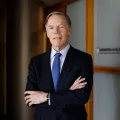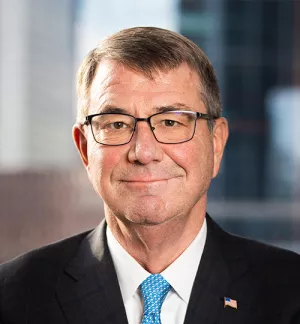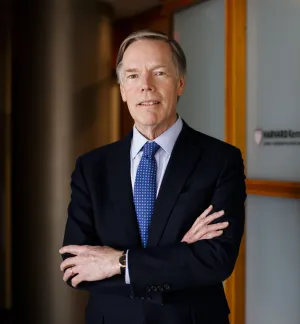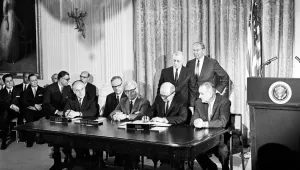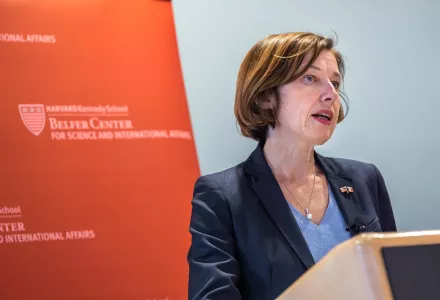
Speech by: Madame Florence Parly, French Minister of the Armed Forces
Dear Ambassador Burns,
Dear Secretary Carter,
Dear friends,
Thank you for hosting this discussion. I would like to start by recalling an event that occurred last year. It had a profound impact on me as a Minister for the Armed forces. And I believe it says a lot about our transatlantic relationship and the challenges we face.
On a dark night early May, silence had fallen on the desert near the border between Mali and Burkina Faso. Silence, yet there was movement. Two special forces task groups were progressing unnoticed. 200 meters in open terrain. They were within ten meters of the camp when a sentry finally realized, and was quickly dispatched. The commandos weren’t sure where the hostages were. These warriors, the elite of the elite, dashed into the tents without firing, for fear of hurting the hostages. They were shot at point blank. That day, an American citizen, a South Korean citizen, and two fellow Frenchmen owed their life to the sacrifice of two brave French soldiers. It was a moonless night, thousands of miles away from home.
This savage night has much to tell us. It tells us that terror in the Sahel is also a threat to America and the world. It tells us that the French military are bearing the brunt of that fight. They do so with a level of professionalism that impressed me upon taking my job. It tells us how well our two nations can cooperate - for such operations are possible only thanks to US assistance in a few critical areas – especially intelligence and surveillance. Thank you, America.
But why do I mention this? As America is currently rethinking its relation to the world, I have a simple message: America is needed. America is needed in the Sahel. America is needed in the Near East. And Alliances are to be treasured: not as burdensome relics, or as commercial endeavours ; but as a web of bonds, of values, of influence, whose collective value far exceeds that of each part.
Now, yes, we are not oblivious to the movement of history. We can see the theater of rivalry moving eastwards. We can see power politics returning to the global stage, with a worrying taste for coercion, and a propensity to use force no longer tempered by the recollection of great wars. We understand that America needs to hold its ground, faced with the new arms races of those new Twenties.
But let us take a closer look. As far as Russia is concerned, we don’t believe that confrontation is inevitable, quite the contrary. Ever since he took office, President Macron has tried to engage with Moscow, and will continue to do so. We have taken strong exception to Ukraine, Crimea, and a number of other things. But we believe that, in the right circumstances, engagement can get us farther than isolation. It is a discussion in which one needs to enter with robust arguments - but we are collectively robust already.
When it comes to China, recent trade agreements concluded in DC show what an important partner this country can be. China’s emergence is the key geopolitical fact of the century, and it rattles here and there. It would not be wise to construe China symbolically as an enemy, or adversary, or whatever the term. It would not be wise, in NATO or elsewhere, to make China the heir of that great seat left vacant by the Soviet Union. Yes, we should be extremely firm on intellectual property, on the security challenges raised by Huawei. Yes, we should be unyielding on breaches of international law in the South China Sea. But I think we should carefully stay away from the business of manufacturing enemies.
I wouldn’t like you to conclude from this that we have become toothless because we are not in the race. France is an old nation. In our history, we have seen our own rise to power. We have seen that of quarrelsome neighbours too. We have experienced war, and collapse. We have witnessed the rise of our great friend America. We have fought almost continuously in the past century and in this; we know the value of force, its risks, its necessity if one is to be respected. We understand America’s changing focus with the changing balance of power. We only say: we hope this does not come at the expense of America’s traditional solidarities.
In a nutshell: go East, young man, but don’t forget your allies.
So we hope America will remain engaged with us: and Africa is a good place to start. I mentioned our cooperation in the Sahel. In those vast expanses of territory, few men and women are doing an enormous work to keep terror at bay. African states are suffering great losses that threaten their very stability. A modicum of US support is having great effects. It leverages the French effort - virtually every major counterterrorism operation is enabled by US assets. It leverages the European effort – as many of our European partners are now joining us in this fight. If US support is withdrawn, there will be months with severely reduced operations. Terror will thrive. Sahelian states will be hit. And paradoxically, it will open an avenue for Russia and China to step in, those very states the National Defense Strategy is meant to keep at arm’s length. Hasn’t Russia signed a military cooperation agreement with Mali last year?
We need America’s engagement: not only in Africa, but also in the Middle East. We know there has been an accumulated Middle East fatigue, after decades of entanglement. We know America’s newly acquired energy independence has changed the sense of geography. But the region is as fragile as ever. Iran has moved from bold and reckless after Aramco, to chastised and vengeful after Soleimani. I am not sure we have reached a balance yet. Is deterrence robustly re-established?
I believe a careful, enduring US engagement can be a powerful element of stability. I can’t insist enough how thankful we are that the US decided to remain in Syria. We are also ready to consider an increased NATO role if it helps shore up the US in the coalition. We have heard recently of a proposal to launch "NATO – ME". As long as it doesn’t mean "NATO, without ME", we are happy to consider.
Europe can partner well with America in this region, even if we may sometimes have differences. Take Iran’s nuclear programme, for instance. We may not side with the policy of maximum pressure, but we are wholly behind the non-proliferation agenda. This is why the Europeans recently activated the so-called Dispute Resolution Mechanism. This was a deliberate gesture, warranted by Iran’s behaviour. Take now maritime security in the Gulf. The Europeans are deploying a maritime surveillance mission that will be very soon operational. It is separate from the US mission, but it will contribute to the same effect.
When they are together, there is no limit to what Europe and America can achieve. I know Palmerston’s theory that states have no friends, only interests. But let me tell you, life in his world must have been nasty, brutish and short. I believe there is something deeper to our bonds than the dullness of calculation. Instead, in those splendid premises of the Kennedy School, can I resist recalling JFK’s extraordinary inaugural address? "To those old allies whose cultural and spiritual origins we share, we pledge the loyalty of faithful friends. United there is little we cannot do in a host of cooperative ventures. Divided there is little we can do -- for we dare not meet a powerful challenge at odds and split asunder."
Allow me to dwell on this for a while. I know there has been recently a discussion in the US about the value of alliances. About whether they were fair to the US. This is a perfectly legitimate question. Having sat many hours on the benches of NATO, EU and other groupings, I know that behaviour in an alliance can sometimes be explained by the work of renowned Harvard sociologist Mancur Olson: minority stakeholders have an irksome propensity to contribute less than their fair share.
Yet, even if that were true – and often it is not -, this would be missing the broader point. I already said that alliances are an influence, not a burden. But beyond this, how can we fail to recognize that the transatlantic alliance, together with a set of other institutions, is the very fabric of world order largely shaped by the US, and of which the US has been the main beneficiary? Who would want to undermine an order that is so wildly in one’s favour?
Of course there needs to be some balance. We don’t want free riders. We wholly support President Trump’s point that the Europeans must do more for their own defense. France itself is making great efforts But, taken together, the transatlantic bond is profoundly in America’s interest: the Europeans promote American values, buy American kit, consult most of their decisions with America, and side with America in its just wars. This fidelity is invaluable, it goes beyond accounting, beyond transaction.
NATO plays a key part in this, and I should add, quoting from the liturgy, that it should remain the cornerstone of our collective security. I was joking previously about NATO-ME, but actually, when the name came out, I liked it. I liked the sound of it : NATOME - it had this vague nuclear overtone, and also that flair of ego and self-scrutiny that should go with a "me". Well, as far as we are concerned, nuclear and self-scrutiny are two things that we strongly advocate for NATO. We have been working constantly on maintaining the Alliance’s nuclear culture. But self-scrutiny is no less important. In London, president Macron highlighted the necessity for the Alliance to rethink its future, strengthen its solidarity, clarify its purpose, improve its balance. We hope the group of wise persons entrusted with this task will be launched soon. It is time to move from "Brain Dead" to "Brainstorm".
NATO is the alliance, Europe is the ally. Europe has sometimes been portrayed here as an economic adversary, or even with a three-letter F-word that I will not dare speak in front of you. But we are one on democracy, we are on the rule of law, on values. Faced with the immense challenges of the world of tomorrow, we should not blow out of proportion the occasional inconvenience of a healthy economic competition. If we do, it is a sin, and Freud has a name for it: it’s called the narcissism of small differences.
But looking to the future, and as I come to my conclusion, what I can promise to you, is that France will always be at your side – sometimes with differences, but with unflinching fidelity when our core values are at stake.
You will find us on the most demanding missions. How many other nations will you find in the delicate business of tracking nuclear submarines – the job of Frigate Normandie, berthed this very day in Boston? Who else with you in space, cyber? Who with you to bomb Asad after the chemical attacks? Who to stick with you in Iraq after the missiles started raining? Who to deploy a carrier strike group in the Mediterranean this very month, and go with you after Daesh? Who to uphold the law of the sea in the Indopacific?
Yes, don’t expect alignment from the gallic temper. But that is the special relationship 2.0. It is loyal, it is constant, but it is also credible, because it is independent and not suspect of kow-towing. It promotes the same values, although with a different voice, and sometimes with a different angle. When I was young, sound systems were called "mono"; but believe me, it is much better in stereo, and that is what we are offering.
Thank you.
The full text of this publication is available via Harvard Kennedy School.


